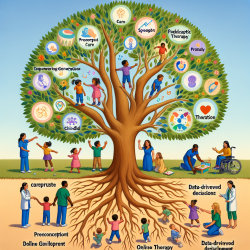Introduction
As speech-language pathologists, our mission is to create optimal outcomes for children by leveraging evidence-based practices. The research article, "The History of Preconception Care: Evolving Guidelines and Standards," provides valuable insights that can enhance our understanding of the factors influencing child development, even before birth. This knowledge is crucial for practitioners who are committed to making data-driven decisions to improve therapeutic outcomes.
The Importance of Preconception Care
Preconception care is a proactive approach that focuses on optimizing the health of women before they become pregnant. The research highlights that this period is critical for reducing risks associated with poor pregnancy outcomes, which can have long-term implications on a child's development. For practitioners in the field of pediatric speech therapy, understanding these guidelines can inform strategies that support early intervention and preventative care.
Key Insights from the Research
- Comprehensive Health Assessments: The research underscores the importance of comprehensive health assessments that include medical, psychological, and environmental factors. For speech therapists, this means considering these factors when assessing a child's developmental history.
- Risk Identification and Reduction: Identifying and mitigating risks before conception can significantly impact child health. This aligns with our goal of early identification and intervention in speech and language disorders.
- Integration of Services: The research advocates for integrated services that encompass preconception, prenatal, and postnatal care. This holistic approach can be mirrored in speech therapy by integrating services across different stages of a child's development.
Applying Research to Practice
As practitioners, we can take actionable steps to incorporate these insights into our practice:
- Collaborate with Healthcare Providers: Work closely with healthcare providers to understand the prenatal and preconception health of the children we serve. This collaboration can provide a more comprehensive view of the child's developmental needs.
- Educate Families: Educate families about the importance of preconception and prenatal care in preventing developmental delays. Empowering families with knowledge can lead to better outcomes for children.
- Advocate for Integrated Care: Advocate for integrated care models that include preconception health as a standard part of pediatric care. This can ensure that children receive the support they need at every stage of development.
Encouraging Further Research
While the research provides a strong foundation, there is always room for further exploration. Practitioners are encouraged to engage in ongoing research to understand the nuances of how preconception care influences child development. This can lead to the development of innovative therapeutic strategies that are grounded in evidence.
To read the original research paper, please follow this link: The History of Preconception Care: Evolving Guidelines and Standards.










